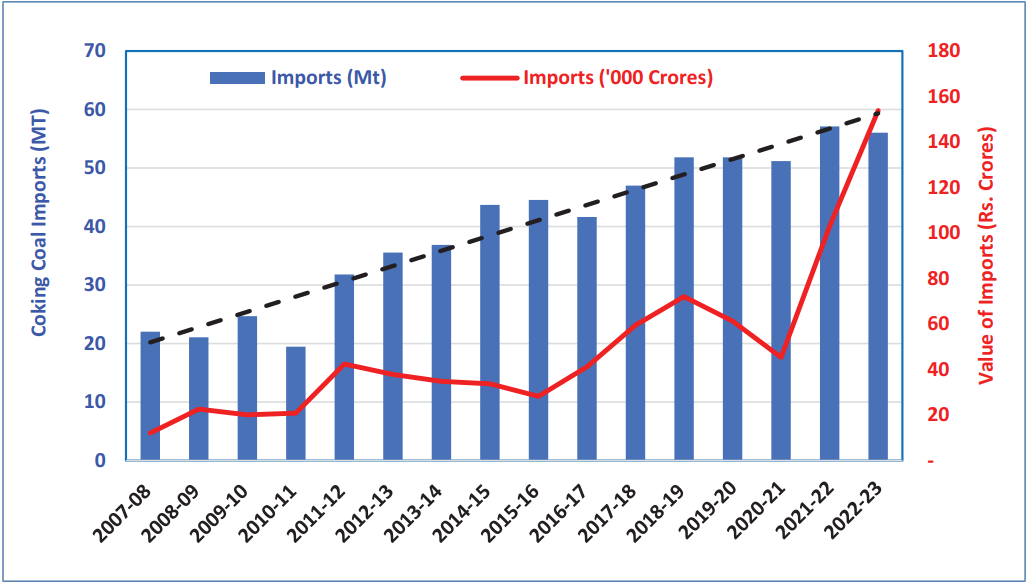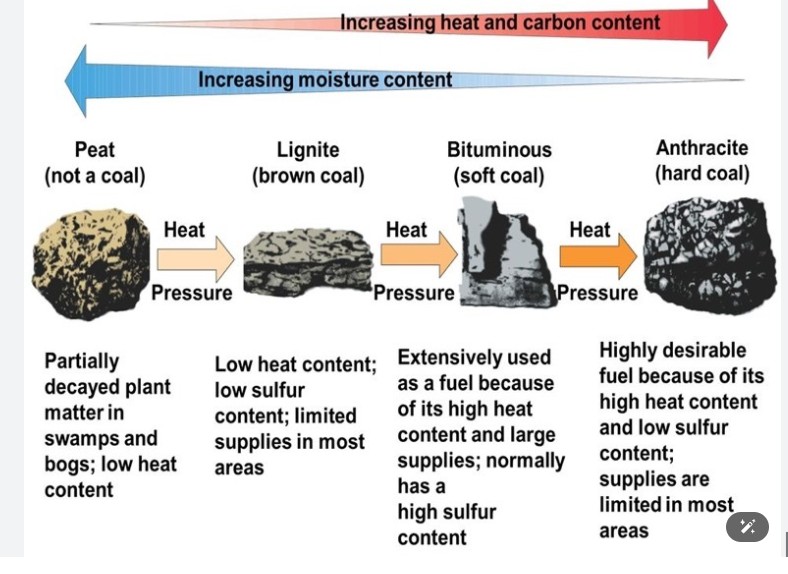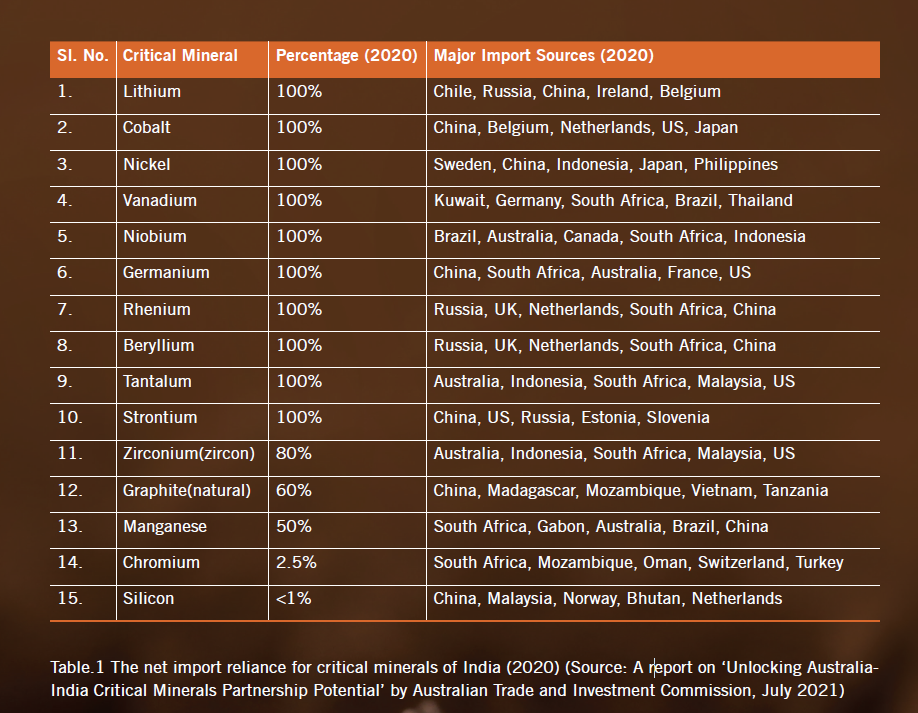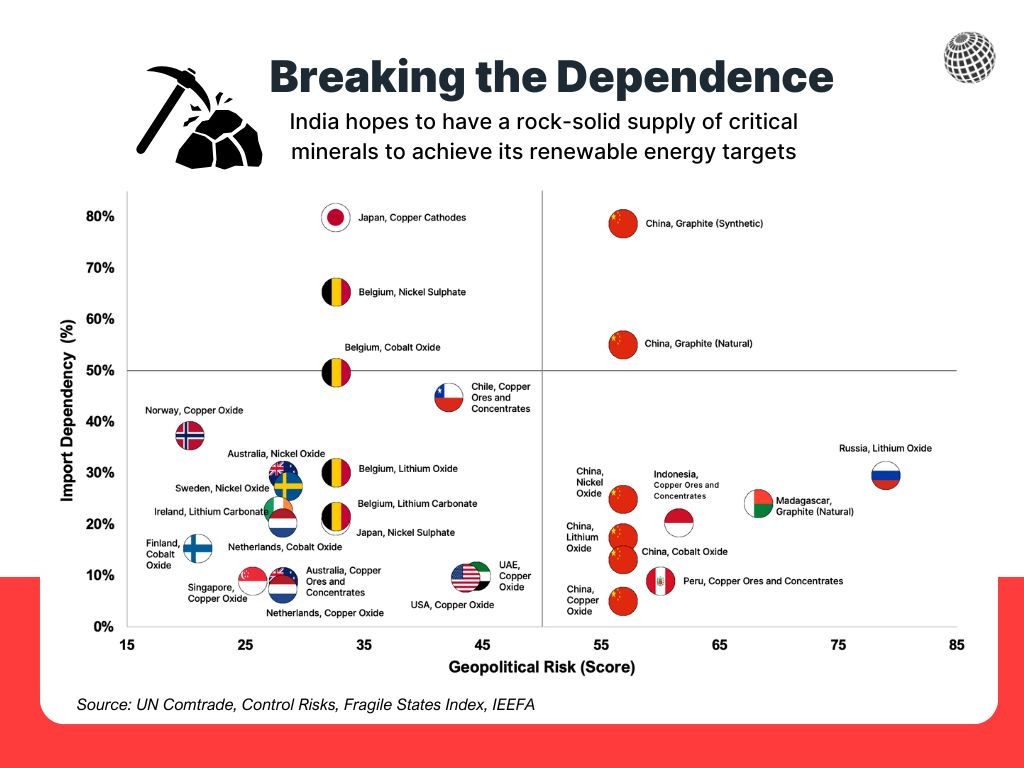Indian Economy
Coking Coal as Critical Mineral
- 25 Nov 2024
- 12 min read
For Prelims: NITI Aayog, Coking Coal, Critical Minerals, Steel Production, European Union, Lithium, Rare Earths, Sedimentary Rock, Special Purpose Vehicles, Volatile Compounds.
For Mains: Significance of coking coal and critical minerals for India.
Why in News?
Recently, a NITI Aayog report titled ‘Enhancing Domestic Coking Coal Availability to Reduce the import of Coking Coal’ advocated coking coal to be included in the list of critical minerals.
Why Should Coking Coal Be Declared a Critical Mineral?
- Meeting Critical Mineral Criteria: Coking coal meets all the criteria to declare coking coal as a ‘critical mineral’ for India.
- Critical minerals have significant economic importance for key sectors in the national economy.
- Critical minerals have a high-supply risk due to the very high import dependence and high level of concentration of set critical raw materials in particular countries.
- There is a lack of (viable) substitutes, due to the unique and reliable properties of these materials for existing, as well as future applications.
- Steel Production: Coking coal is a vital raw material for steel production, constituting approximately 42% of the cost of steel, which is crucial for infrastructure development and job-creating sectors in India,
- The availability of affordable coking coal is crucial for the economy.
- High Import Dependence: India imports about 85% of its coking coal, much higher than the European Union’s (EU) 62%, posing risks to its steel industry and economic stability.
- Domestic production of coking coal could have saved Rs 1.5 lakh crore in FY 2023-24 for import of 58 metric tonnes of coking coal.
- Large Domestic Reserves: India holds significant proved reserves of coking coal—16.5 billion tonnes of medium-quality and 5.13 billion tonnes of prime-quality coal.
- Using these reserves for metallurgical purposes can enhance energy security, reduce supply chain risks, and support domestic steel production.
- Steel Industry’s Competitiveness: In FY 2023-24, Integrated Steel Plants (ISPs) imported 58 metric tonnes of coking coal, costing approximately Rs 1.5 lakh crore.
- Declaring coking coal a critical mineral can boost domestic production, lowering steel production costs and enhancing global competitiveness.
- Full Capacity Utilisation: The capacity utilisation of PSU washeries was less than 32% in FY 2022-23 while the washed (clean) coal yields were only 35-36%.
- Investment and subsidies for adoption of efficient technologies in washery equipment can improve their efficiency and reduce costs.
- Global Practices: EU has declared coking coal as a critical raw material along with 29 other raw materials which include ‘green energy’ minerals like lithium, cobalt, and rare earths.
- India’s decision to similarly classify coking coal would align with global practices and prioritise it as a key resource for economic development.
- Energy Security and Sustainability: India's focus on developing domestic coking coal reserves can reduce import reliance and strengthen energy security while supporting its Net Zero emissions goal by 2070.
Coking Coal and India
- High Dependence on Imports: India’s coking coal imports for the first half (H1) of FY25 (April-September) reached 29.6 million tonnes (mt), marking a six-year high.
- Globally, India is the largest importer of coking coal.
- Higher Steel Production: The increase in coking coal imports coincides with a rise in India’s steel production.
- Globally, India is the second largest producer of crude steel after China.
- Top Importing Countries: Australia, US, and Russia are the largest suppliers of coking coal to India.
- Trend in Imports: Shipments from Russia saw a substantial 200% increase between H1FY25 and H1FY24.
- Australia's share of India's coking coal imports has dropped to 54% (16 mt) in H1FY25, down from 80% (21.7 mt) in H1FY22.
- Diversification: There has been a slight increase in sourcing from Mozambique and Indonesia.
What are the Key Facts About Coking Coal?
- About: Coking coal (or Metallurgical coal) is a naturally occurring sedimentary rock found within the earth’s crust.
- It encompasses a wide range of quality grades including hard coking coal, semi-hard coking-coal, and semi-soft coking coal. All are used to make steel.
- Coking coal typically contains more carbon, less ash and less moisture than thermal coal, which is used for electricity generation.
- Formation of Coke: Coking coal is heated in the absence of air in coke ovens to produce coke, a porous, carbon-rich material.
- This process, called coking, removes volatile compounds from the coal, making the coke suitable for use in the blast furnace.
- Role in Steelmaking:
- Fuel: Coke burns at high temperatures (around 1,000°C to 1,200°C) to produce carbon monoxide (CO), which is used to reduce iron ore (Fe2O3) into molten iron.
- Reducing Agent: Carbon monoxide (CO) reacts with iron ore in the blast furnace to reduce iron oxide (Fe2O3) into iron (Fe).
- Coking Coal Production: The largest producers of coking coal in 2022 were China (62%), Australia (15%), Russia (9%), USA (5%) and Canada (3%).
- Strategic Importance: Steel is cited as a strategic material in all industries related to the low-carbon transition.
- About 780 kg of coking coal is needed to produce 1 ton of steel.
- By-Products of Coke Production: By-products such as tar, benzole, ammonia sulphate, sulphur, and coke oven gas are used in chemical manufacturing and for heat/power generation.
What are Critical Minerals for India?
- Global Scenario: The list of critical minerals varies among countries, depending on their industries and priorities.
- For example, the United States has identified 50 critical minerals, Japan has identified 34, the United Kingdom has 18, the European Union has 34, and Canada has 31.
- Indian Scenario: India has identified a total of 30 minerals that are found to be most critical for India where India must prioritise its efforts to ensure an uninterrupted supply chain.
- List: The identified minerals include Antimony, Beryllium, Bismuth, Cobalt, Copper, Gallium, Germanium, Graphite, Hafnium, Indium, Lithium, Molybdenum, Niobium, Nickel, PGE, Phosphorous, Potash, REE, Rhenium, Silicon, Strontium, Tantalum, Tellurium, Tin, Titanium, Tungsten, Vanadium, Zirconium, Selenium, and Cadmium.
- States/UTs with Critical Minerals: The states/UTs housing these minerals are Bihar, Gujarat, Jharkhand, Odisha, Tamil Nadu, Uttar Pradesh, Chhattisgarh, and Jammu and Kashmir.
- India’s Import Dependency: India is heavily reliant on imports for critical minerals, with 100% import dependency for minerals like lithium, cobalt, and nickel.
- This dependency is likely to continue, as demand for these minerals is expected to double by 2030.
What are India’s Initiatives to Secure Critical Minerals?
Conclusion
- Coking Coal as a ‘Critical Mineral’: Coking coal should be declared a critical mineral as recommended by NITI Aayog to boost domestic production, enhance steel sector competitiveness, and create skilled manufacturing jobs.
- Whole-of-Government Approach: To address the shortage of domestic metallurgical coal, NITI Aayog recommends a 'whole-of-government' approach involving multiple ministries (Coal, Steel, Environment, and Forests).
- Private Participation: Special Purpose Vehicles (SPVs) should be formed in the Public-Private Partnership (PPP) mode for the development of coalfield reserves.
- Optimising Coal Production: The production of metallurgical coal requires collaborative teamwork among mine planners, geologists, mining engineers, and washery operators.
|
Drishti Mains Question: Discuss the strategic importance of coking coal for India’s steel industry and economy. How can India address its high dependency on imports of coking coal? |
UPSC Civil Services Examination Previous Year Question (PYQ)
Prelims
Q. In India, the steel production industry requires the import of (2015)
(a) saltpetre
(b) rock phosphate
(c) coking coal
(d) All of the above
Ans: (c)
Q. Despite having large reserves of coal, why does India import millions of tonnes of coal? (2012)
- It is the policy of India to save its own coal reserves for the future, and import it from other countries for the present use.
- Most of the power plants in India are coal-based and they are not able to get sufficient supplies of coal from within the country
- Steel companies need large quantity of coking coal which has to be imported
Which of the statements given above is/are correct?
(a) 1 only
(b) 2 and 3 only
(c) 1 and 3 only
(d) 1, 2 and 3
Ans: (b)
Mains
Q. Despite India being one of the countries of Gondwanaland, its mining industry contributes much less to its Gross Domestic Product (GDP) in percentage. Discuss. (2021)
Q. “In spite of adverse environmental impact, coal mining is still inevitable for development”. Discuss. (2017)









-min.jpg)